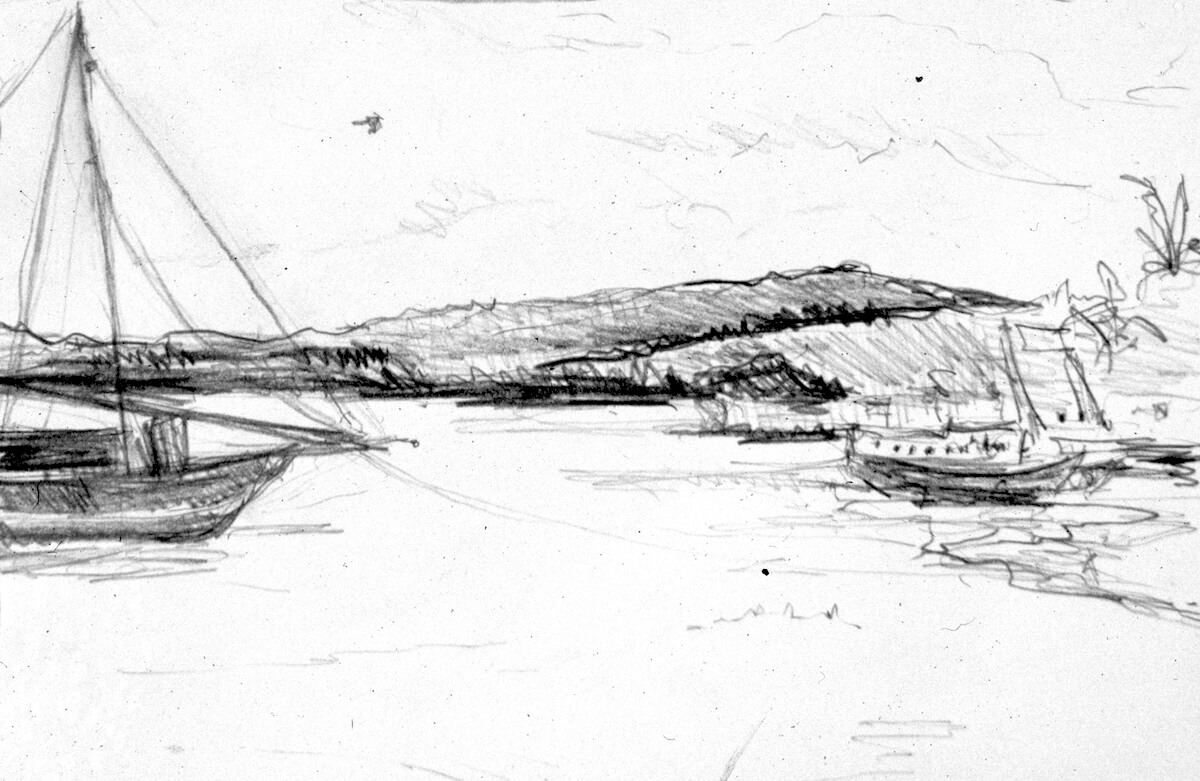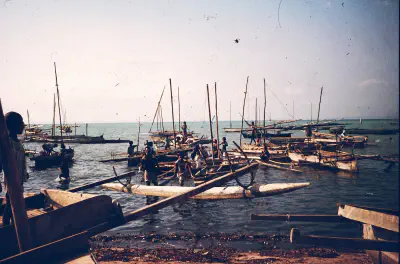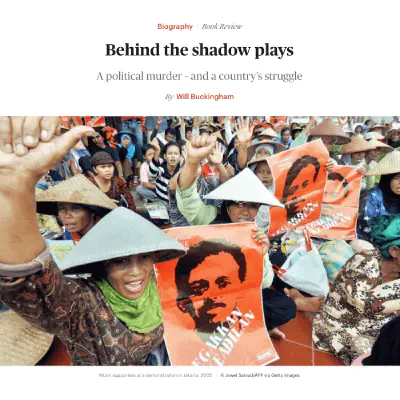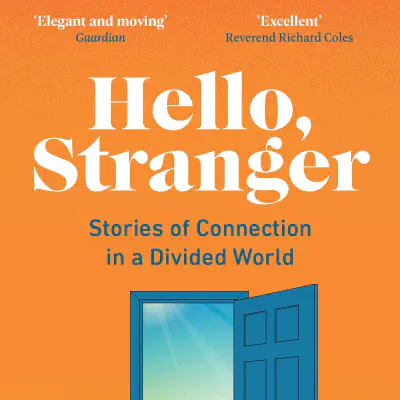Six years ago, I published my first, and — as yet — only travel memoir, Stealing With the Eyes: Imaginings and Incantations in Indonesia. The book is about my early ambitions to become an anthropologist, and how — whilst doing fieldwork in the Tanimbar islands of East Indonesia — these ambitions slowly unravelled. As such, like many travel memoirs (and it says clearly on the back cover that this is travel writing, not a contribution to academic anthropology), it is also a book about failure. It is a book about how, when trying to make sense of the world, we find ourselves messing up.
At the heart of the book is a preoccupation with gift exchange, the cycle of gift and counter-gift that undergirds our lives. And Stealing With the Eyes is a book about how, in this ticklish business of getting along with each other, things can go awry, even in the face of the best intentions on all sides. But above all, perhaps, this is a book about trying to find some kind of restitution despite all this, about how despite everything our failings may be made good.
The book came out in 2018 to no great fanfare, published by the excellent Haus Publications in London. It got a few decent reviews here and there. I did some book events for a year or so, in the UK and in Indonesia, and then things quietened down. Occasionally in the years since its publication, I have received appreciative emails from readers with connections to the Tanimbar islands, and it’s always a delight to receive them. But over the past couple of years, I’ve not really thought much about the book at all. So it was a surprise to wake up this morning to find that a couple of weeks back (accompanied by an admittedly excellent black and white photograph), the book was at the heart of an article on the History Reclaimed website, where this book about failure and making good is referred to as a “post-modern assault on anthropology.”
The article was by C.R. Hallpike, Emeritus Professor of Anthropology at McMaster University, Canada, who, the tag-line tells us, “takes issue with the fashionable idea that anthropologists oppress, demean, and appropriate indigenous cultures.” I was puzzled as to why my very modestly-selling travel memoir should be selected as a prime example of this fashionableness (if this idea were really that fashionable, I expect there would be better-selling examples one could choose). Nevertheless, I was interested to see what he had to say about the book. Unsurprisingly, it turns out that what he had to say was not at all complimentary. After a preamble about the trouble with postcolonial approaches to anthropology, the article launches into a full-frontal assault.
The title of my book, Stealing With the Eyes, is a direct translation of the Indonesian phrase “curi mata.” In Tanimbar, I was researching the work of contemporary sculptors. And it was the first of these sculptors I spoke to, Matias Fatruan, who challenged me by saying that I had come to Tanimbar to “steal with the eyes.” I’m going to quote the whole passage here, because the context matters. It is the story of one of my first meetings with Matias. The setting is Matias’s house on the island of Sera, and Matias is not at all sure he wants to show me his work.
As the sky outside the house darkened, however, Matias seemed to tire.
‘That is enough for today. Come back tomorrow,’ he said. ‘We can talk some more then.’ Then he leaned over and with a degree of theatricality pulled out a bag from under the table. The bag clattered as he placed it on the table between us. ‘Tomorrow, maybe, I will show you my traditional sculptures,’ he said. He paused. ‘Or perhaps I will decide not to show you,’ he said.
‘I’d like to see them,’ I said.
‘Maybe. But I’m afraid.’
‘Afraid? Why?’
‘These sculptures come from my own imagination, my own mind.
They are my sculptures.’ He patted the bag.
‘Yes, I know.’
‘I’m afraid that you will steal them.’
The accusation was unexpected. I felt a surge of affronted indignation. ‘No,’ I said. ‘Of course I am not here to steal.’
Matias held up his hand. He spoke softly. ‘I do not think that you have come to steal with the hands,’ he said. ‘I am afraid that you have come to steal with the eyes.’
Matias’s gaze was steady. I looked away guiltily.
Eventually, things with Matias broke down. I never saw what was inside that bag. And over the months that followed, this charge — that I was in Tanimbar to “steal with the eyes” — was one that I found hard to shake, both during my time in Tanimbar, and after my return.
Matias was all too aware of the power dynamic between us. And he was also eager to do everything he could to subvert it. But in his article, Hallpike takes issue with all of this. He does this by quoting James Fox, professor of anthropology at Australian National University. It’s not clear where the quote comes from, as it is unsourced. I can’t find any obvious citation, so I’m guessing it may be from personal communication. And I confess that it is slightly dismaying that Fox, an anthropologist whom I admire, is also so apparently disapproving of my travel memoir. Here is what Fox has to say, as quoted by Hallpike:
An approximation of curi mata in English might be ’to steal a look’: hence, in different contexts, it might mean ’to glance’ or ’to preview’ or possibly even ’to spy.’ He [Will Buckingham] obviously didn’t have enough command of eastern Indonesian Malay to understand his informants and therefore as a philosopher has been able to erect his argument based on his misunderstanding.
This allows Hallpike to conclude (having assured readers — although I have no idea on what evidence — that my knowledge of Indonesian at that specific point in 1994 was “slender”) that this idea of stealing with the eyes is nothing more than, “a morbid and fantastic expression of liberal guilt.”
I hesitate to question such an authority as James Fox. But nevertheless, this reading of the passage in my book seems profoundly odd. The context in which I am quoting Matias — and the entire context of our difficult dialogue that unfolded over a several long days — makes clear that this was a direct accusation. It has nothing to do with stealing a look, or taking a peek. And it has everything to do with — real or metaphorical — theft. Matias says: I am afraid you will steal. Then, when I rebuff him, he goes on to clarify his meaning, with masterful subtlety. Yes, he says, to steal. No, not with the hands. But with the eyes. It could hardly be clearer.
Having put this down to a deficiency in my Indonesian, however, Hallpike argues that “so-called ‘stealing with the eyes’, is not stealing in any meaningful sense of the word.” But this fails to give credit to Matias’s position. Perhaps we’d do better to assume that when people say things, they sometimes mean what they say: Matias accused me of stealing, and he meant it.
It is an uncomfortable fact that, from time to time, the people anthropologists study talk back. And when talking back, sometimes they say things that anthropologists don’t like. To put this down to mistranslation, to my allegedly bad Indonesian, or to my alleged morbid liberal tendencies, completely sidesteps this issue that Matias had with me, and wilfully misconstrues the context.
Hallpike concludes:
Buckingham’s aversion to gathering ethnographic data [seems] to be getting at something rather different, the belief that extracting information from native informants that is of professional value to the anthropologist is a kind of exploitation at the expense of the informant, people from rich countries doing well on the backs of people in poor countries by writing books and gaining professional prestige from their experience.
The truth is, however, that I was not at all averse to gathering ethnographic data. I was hungry for it. The problem was that Mathias was averse to furnishing me with this data, on the not unreasonable grounds that my desire for “data” was a kind of appropriation. And, of course, this appropriation is not the whole story of anthropology. It is not even necessarily the most important part of the story. But, on that particular day in 1994, it was very specifically the story that Matias (my “informant”) wanted to tell me.
This almost Socratic dialogue with Matias from the book makes this abundantly clear.
‘Ah,’ Matias said. […] ‘So you come here for science, for knowledge?’
‘Yes.’
‘That is good. Science and knowledge are good. But tell me something: when you write your book, will you make any money?’
I felt uneasy. ‘A little, perhaps,’ I said.
‘You will make more than I will,’ he said.
I paused. ‘Yes,’ I said quietly, because he was right. ‘But not much.’
He raised his eyebrows. ‘You say not much, but I find this strange. I am here in my home in Sera, and I see you, an Englishman, sitting here also, and I think: he can afford to come here. That must cost money. He is sitting in my house in Sera, but I am not sitting in his house in England. This means that he must have more money than I do.’
‘Yes,’ I said again. This is not going well, I thought.
Reading Stealing With the Eyes again after a gap of six years, I think I am at times unfair to anthropology. As Kate Wakeling pointed out in her review in the Times Literary Supplement, the objections to anthropology I put forward in the book are in many ways nothing new. Wakeling writes, “James Clifford and George Marcus’s influential book Writing Culture raised the epistemic and political problems of ethnographic representation in 1986, and progressive anthropologists have been addressing these issues head-on for decades.” Perhaps the book would have been stronger had I acknowledged this (although, of course, what Wakeling is citing is precisely the kind of postcolonial anthropology of which Hallpike disapproves). But Wakeling also generously recognises that Stealing With the Eyes is not, ultimately, an attempt to make a contribution to anthropology. It is, instead, a travel memoir. Wakeling writes:
As a memoir, however, Stealing with the Eyes is powerful. Buckingham has a wonderful eye for detail, and the tale he has woven is gripping. And as he discovers, it is stories that matter most of all in Tanimbar. It is through rich and complex myths that the Tanimbarese discuss their past. Indeed, when Buckingham goes to buy a collection of folk tales at the local bookshop, the shopkeeper declares “This is a good book … Yes, folk tales. This is our history in Tanimbar”.
Hallpike ends his piece on my fashionable post-modern assault on anthropology, by arguing that, “anthropology has been one of the most humane exercises in the history of Western scholarship.”
Here, at last, I find myself in agreement. I believe in a humane anthropology, or the possibility of a humane anthropology. And it is on account of this possibliity that I still love anthropology, and still believe that for all its troubled history, it is an important discipline. Nevertheless, it seems to me that the path to a more humane anthropology, or a more humane world, does not lie through ignoring difficulty and complexity. Whenever we are unsettled, it is to take the easy path to simply decry postmodernism, or to claim mistranslation, or to diagnose morbid liberal guilt. But the path to a more humane anthropology (or a more humane anything) is a more difficult one. And this path sometimes begins when our informants and friends, our companions and fellow human beings say to us, “you have come to steal with the eyes,” and for a moment, we give them credit for meaning precisely what they say.
Image: Saumlaki bay, Tanimbar. Drawing. © Will Buckingham, 1994



